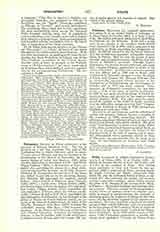

Polignac, MELCHIOR DE, cardinal, diplomatist, and writer, b. of an ancient family of Auvergne, at Le Puy, France, October 11, 1661; d. in Paris, April 3, 1742. He studied with great distinction at the College de Clermont and the Sorbonne. While still a young man, he was present at the conclave which elected Pope Alexander VIII in 1689; and he took part in the negotiations at Rome concerning the Declaration of 1682. In 1691 he assisted at the election of Innocent XII, and in 1693 was appointed ambassador extraordinary to Poland. Here he won the favor of John Sobieski, and succeeded in having the Prince de Conti chosen as Sobieski’s successor. Through Conti’s dilatoriness, the election proved ineffectual, and Louis XIV, blaming Polignac, ordered him to return to his Abbey of Bon-Port. In 1702, however, he was granted two new abbeys and in 1706 sent to Rome, with Cardinal de la Tremoille, charged to settle the affairs of France with Clement XI. Between 1710 and 1713 he energetically supported French interests at the Conferences of Gertruydenberg and the Congress of Utrecht, and in 1713 was made cardinal. Compromised in Cellamare’s conspiracy, he was banished, in 1718, to his abbey of Auchin, in Flanders. In 1724 he was again placed in charge of French interests at Rome and assisted at the conclave which elected Benedict XIII. For eight years he represented his country at the Court of Rome, occupied with the difficulties arising out of the Bull “Unigenitus“, and returned to France in 1730, having been Archbishop of Auch since 1724.
Devoted to art and literature, and the collection of medals and antiques, Polignac became a member of the Academy in 1704, succeeding Bossuet. His addresses, sometimes delivered in Latin as correct and fluent as his French, were much admired. His great work, “Anti-Lucretius”, a poem in nine books (Paris, 1745), offers a refutation of Lucretius and of Bayle, as well as an attempt to determine the nature of the Supreme Good, of the soul, of motion, and of space. His philosophical views—generally similar to those of Descartes—are questionable, but the poem is, in form, the best imitation of Lucretius and Virgil extant.
J. LATASTE

